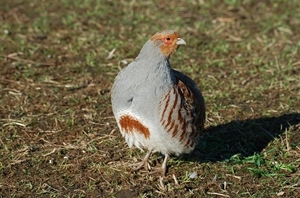 Last summer was the wettest for 100 years and wild grey partridges were one particular species that paid the price for the appalling wet conditions. Although many young partridge chicks failed to survive, recent figures released by research charity, the Game & Wildlife Conservation Trust (GWCT) showed that there is still reason to be optimistic as the over-winter survival of adult birds was much better than expected.
Last summer was the wettest for 100 years and wild grey partridges were one particular species that paid the price for the appalling wet conditions. Although many young partridge chicks failed to survive, recent figures released by research charity, the Game & Wildlife Conservation Trust (GWCT) showed that there is still reason to be optimistic as the over-winter survival of adult birds was much better than expected.
However, this red-listed species, which was once common across the country, has suffered a drastic decline of more than 86 per cent over the past 40 years and needs a considerable amount of positive management to ensure its future survival across the country.
Henrietta Appleton, the GWCT’s regional advisor for the north of England, explains, “North-West Cumbria is a key area for wild grey partridge populations in the county due to the nature of the landscape and the mixed farming system. However these populations are “on the edge” as residual densities are just 2 pairs per km2 and without supporting management may become locally extinct.”
For those keen to see how they can restore this iconic farmland bird, the Game & Wildlife Conservation Trust is holding a farm walk at Red Hall Farm near Wigton on Thursday 24th October to discuss the management required in more detail. Red Hall Farm, run by Martin Baird, is the current holder of the Trust’s Cumbrian Grey Partridge Group trophy and clearly demonstrates how good habitat supported by targeted predation control can offer renewed hope for wild grey partridge and other farmland bird populations.
The farm walk will focus on year round habitat provision including the importance of identifying and growing the right wildlife crops, with a particular emphasis on winter cover, which helps to minimise predation at critical times of the year. In addition, providing extra food (including supplementary feeding) through to early summer is vitally important as it improves the condition of birds in the lead-up to the breeding season.
The event will be led by Henrietta Appleton of the GWCT, John Bowman of Natural England and Meehal Grint of Kings Game Cover and Conservation Crops, who are kindly sponsoring the event. The event on the 24th October at Red Hall Farm will start at 10.30 a.m.
Tickets cost £15.00 per person including refreshments (tea/coffee and a light lunch) and can be booked either on line: www.gwct.org.uk/courses; or by contacting Lynda Ferguson by email: advisory@gwct.org.uk or telephone: 01425 651013.
END
Photocaption: The grey partridge has suffered a drastic decline over the past 40 years, but positive management offers renewed hope.
Notes to editors
The Game & Wildlife Conservation Trust – providing research-led conservation for a thriving countryside. The GWCT is an independent wildlife conservation charity which has carried out scientific research into Britain’s game and wildlife since the 1930s. We advise farmers and landowners on improving wildlife habitats. We employ 22 post-doctoral scientists and 50 other research staff with expertise in areas such as birds, insects, mammals, farming, fish and statistics. We undertake our own research as well as projects funded by contract and grant-aid from Government and private bodies. The Trust is also responsible for a number of Government Biodiversity Action Plan species and is lead partner for grey partridge and joint lead partner for brown hare and black grouse.
For information, contact:
Eleanor Williams
Telephone: 07592 025476
Email: press@gwct.org.uk